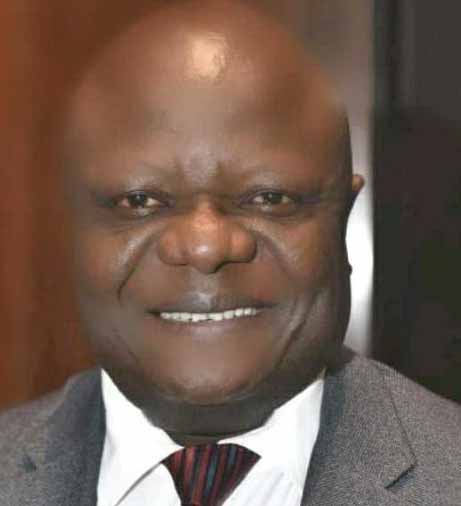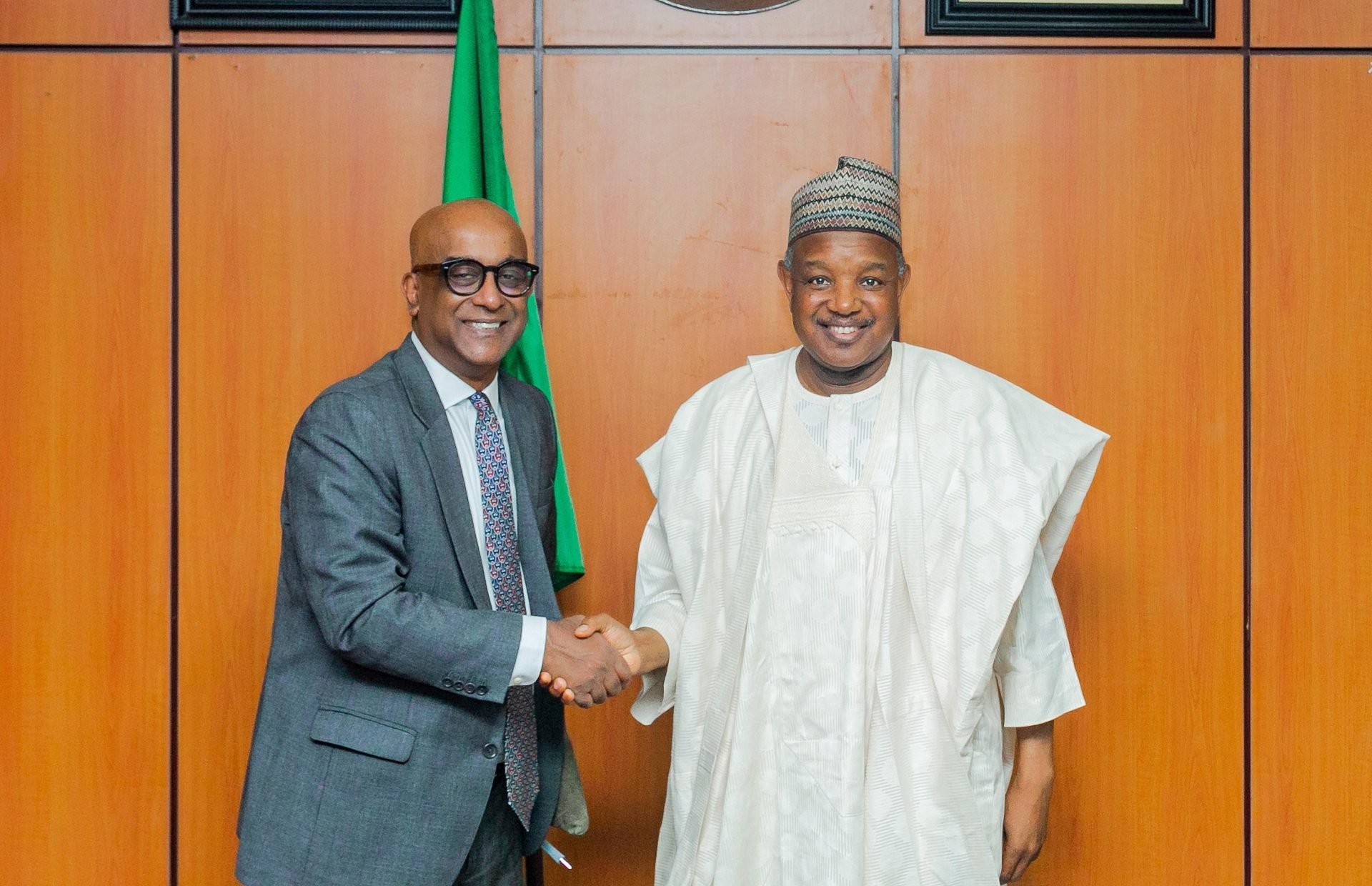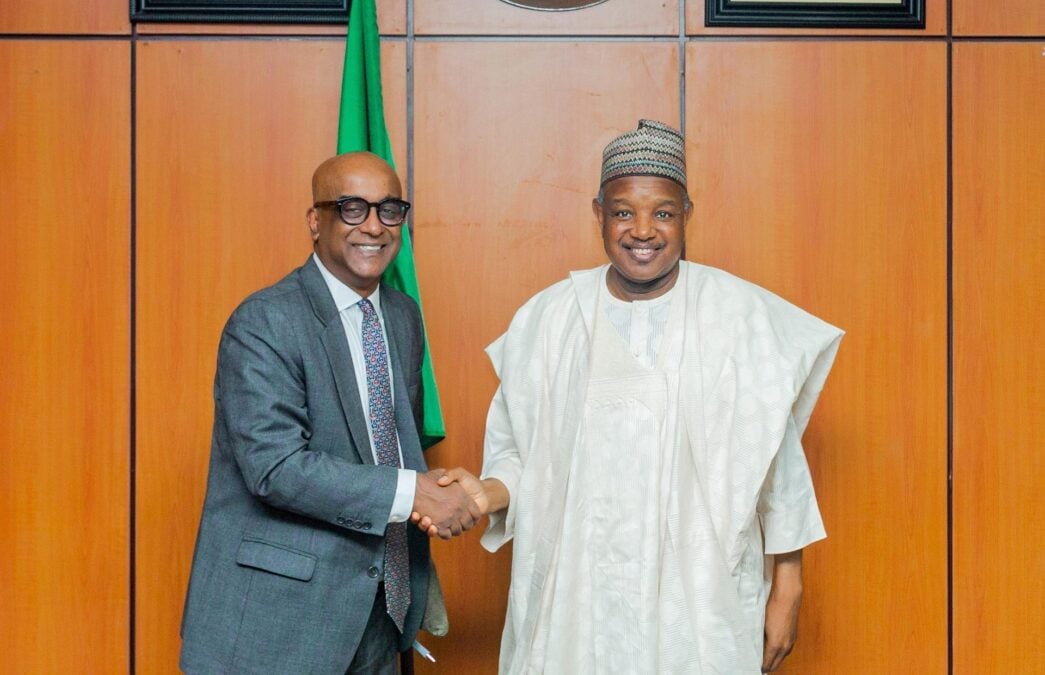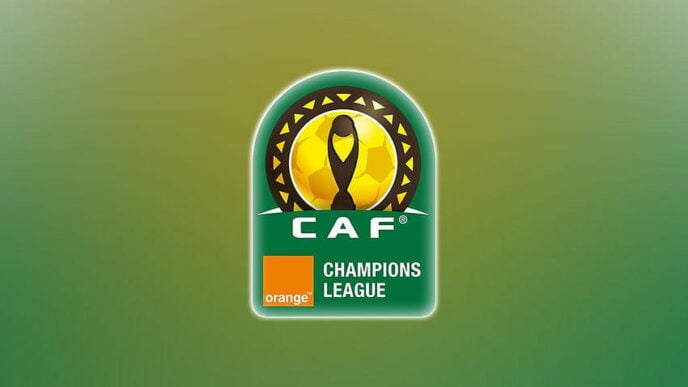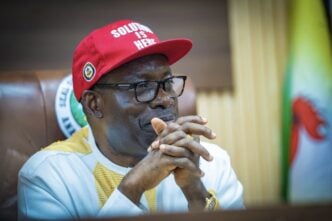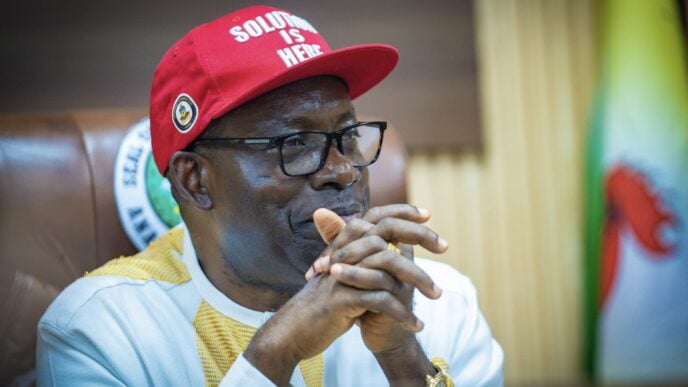Country Director, World Bank, Matthew Verghis (left), and Minister of Budget and Economic Planning, Senator Abubakar Bagudu, during the courtesy visit by the new country director to the minister in Abuja
The Federal Government of Nigeria recently launched the “Renewed Hope Ward Development Programme”, an idea which has been endorsed by the World Bank through its Nigeria Country Director, Mr. Matthew Verghis. The programme intends to translate Nigeria’s macroeconomic reforms into actual and tangible benefits in local communities across Nigeria’s 8,809 wards.
The programme which is domiciled with the Ministry of Budget and Economic Planning and approved by the Federal Executive Council is expected to create sustainable and inclusive growth from rural communities, map socioeconomic activities across communities and support at least 1000 active citizens per ward to generate sustainable socioeconomic value in the government commitment to achieve a US$1 trillion economy by 2030 and lift millions of Nigerians out of poverty. This is an ambitious and inclusive thinking that is required to position Nigeria for competitiveness in the 4th industrial revolution or sustainable industrialisation. It will also advance the country’s capability to build sustainable and economic viable grassroots and position for the just transition as no one and no community will be left behind.
It is important to state that though this is an innovative socioeconomic initiative across the length and breadth of Nigeria, it needs to be carefully implemented to achieve its intended goals. One way to do this is to operationalize the initiative through some of indigenous models with significant potentials. This is where the One Kindred One Business (OKOBI) initiative from the Imo State government Kindred Economic Empowerment Paradigm (KEEP) for grassroots development comes to mind. OKOBI fosters sustainable entrepreneurship by incentivising each extended family unit or “kindred” to establish one communally-owned enterprise aligned with their indigenous interests, passions, capabilities, and resources. The kindred wholly lead and controls the business. In addition to transforming lives within local communities, OKOBI furnishes wider socioeconomic benefits.
OKOBI mobilises these tight-knit relationships through inclusive financing, training and a platform to jointly own and run micro, small and medium enterprises (MSMEs) on a sustainable basis. OKOBI was reportedly launched by the Imo State Government in 2022 to boost grassroots economic participation and enhance incomes by addressing unemployment. The goal was to encourage every kindred unit in Imo State to establish one business providing goods and services needed by communities. Members of non-kindred affiliations like religious groups, social clubs and cooperative societies were also eligible to boost enthusiasm and participation.
Advertisement
The socio-economic agenda also aims to uplift Imo State large informal sector traders and rural smallholder farmers by connecting them to formal financing and technologies as organised cooperatives and collectives. OKOBI provides innovative solutions such as collective marketing support and microfinance to empower vulnerable communities, increase productivity, minimise harvest losses and enable fair access to urban markets. It harnesses Africa’s standing tradition of collective action and mutual aid to promote the establishment of profitable commercial ventures.
OKOBI’s implementation is said to have led to the setting up of over 450 diverse and resilient group owned businesses with almost 15,000 members, empowering and mobilising local communities to significantly drive their own economic growth. This has led to the successful launch of initiatives across various sectors such as sustainable agriculture, food processing and value addition, clean energy, inclusive community finance, etcetera. This model backed by skills and entrepreneurship training and advisory services has not only proven to be successful in promoting community-driven economic development but has also set a benchmark for sustainable and equitable growth within communities.
Examples of these businesses include, A-92 Farmers Multipurpose Cooperative practicing climate-smart ecological techniques to improve soil health, land productivity and smallholder farmer incomes over the long-term. The New Emii Cooperative that procures surplus produce from farmers during seasons of glut and process them into various pastes, snacks and flours in decentralised processing hubs. Green-Era Technologies that offer end-to-end solar energy solutions for roadside nano-enterprises who relied extensively on expensive diesel generators previously. Akuyoma Amaimo Cooperative that mobilises and lends microfinance sustainably by harnessing collective thrift and trust within local communities through member savings and peer monitoring mechanisms. These community investment funds identify and nurture promising informal retail shops, farming initiatives and cottage manufacturers.
Advertisement
The OKOBI initiative has focused on financing enterprise activity through direct investments and grants opportunities, organising vocational skills bootcamps, digital literacy camps and business plan competitions to expand economic opportunities for marginalised youth. OKOBI unlocks grassroots innovation pipelines and bridges talent gaps through sponsoring promising entrepreneurs to accelerator programs and leveraging university partnerships.
These efforts are designed to unlock the potential of marginalised resources and aspirations in order to address pressing developmental needs and challenges. It offers government a mechanism to formalise grassroots microenterprises, enabling them to access finance, technologies, and markets to expand. These businesses could become big businesses and when aggregated the micro-ventures can energise broad-based sustainable industrialisation and sustainable socio-economic development.
It is no gainsaying that the Renewed Hope Ward Development Programme has an existing institutional developmental structure to leverage on in OKOBI. OKOBI’s socioeconomic pedigree is grounded in scholarship as it was subject to one year (2024/25) research fellowship at the New Institute in Hamburg, Germany. This led to the publication of a governance handbook for OKOBI businesses. OKOBI has also been the subject of scholarly discourse across universities in Europe including at the prestigious Oxford University. With such grounding as a model for inclusive development, the Ministry of Budget and Economic Planning could rely on the OKOBI framework for the ward initiative. This would ensure that the initiative takes off effectively owing to the contextual nature of OKOBI to the Nigeria socioeconomic environment.
This approach would strengthen the initiative and ensure its desired objective to drive inclusive development is achieved. This is an opportunity for Nigeria to truly advance a socioeconomic philosophy that is homegrown, indigenous to us and tested. This will boost rural economies in Nigeria and enhance their market competitiveness in the global economy. This handshake and collaboration are required for a successful Renewed Hope Ward Development Programme.
Advertisement
Adeniyi, a professor, writes from Abuja.
Views expressed by contributors are strictly personal and not of TheCable.
